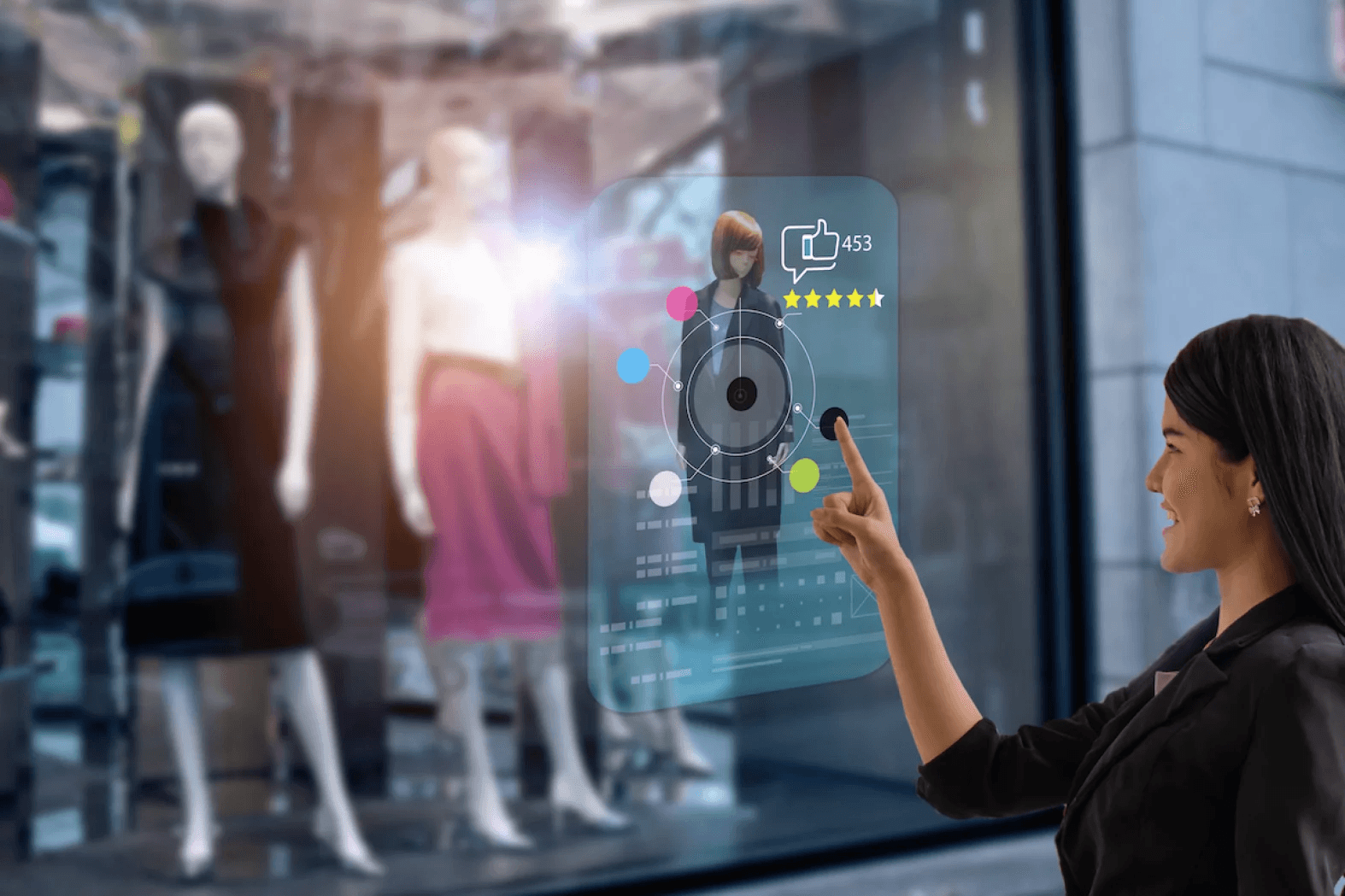Back to Blog
eCommerce in the metaverse: How virtual reality is changing online shopping
May 24, 2023
Martin Petkov
As emerging technologies in the Web3 space advance and the metaverse rises to prominence, eCommerce brands are hard-pressed to evaluate how they might revolutionize the industry. Though the industry has faced the cryptocurrency market turmoil and specific metaverse platforms still struggle with clunky interfaces, real customers still populate the space. Integrating the metaverse into existing eCommerce strategies could pay off in the long run. Metaverse-driven eCommerce can enhance shopping experiences, improve product interactions and create personalized experiences. The platform will also allow eCommerce brands to create memorable experiences, reach new customers, and level the playing field for smaller businesses. However, challenges exist, and brands must learn how to tackle the lack of expertise in the space, the steep consumer learning curve, and security concerns akin to the metaverse.

What is metaverse eCommerce?
eCommerce experiences in the metaverse are online shopping experiences integrated with a three-dimensional virtual world where consumers can browse inventory, interact with it, and purchase products or services. The metaverse eCommerce experience bridges the gap of Web2 shopping by providing a highly immersive environment where products can be experienced as high-quality 3D visuals and virtual clothes can be tried on.
These metaverse shopping experiences also allow consumers to enter virtual stores and experiences that echo a company’s culture, design aesthetic, and branding elements. This can create a memorable shopping experience leading to consumers developing greater loyalty and trust in a brand. eCommerce companies can also collect rich consumer data to build customer personas and refine real-time shopping recommendations.
While traditional retail has been historically driven by physical-to-physical commerce, eCommerce in the metaverse can be virtual-to-physical, physical-to-virtual, and virtual-to-virtual commerce.
Virtual-to-physical: This occurs when a purchase is made in a virtual world, marketplace, or gaming experience but also offers a physical product or experience.
Physical-to-virtual: A scenario involving purchasing a physical product or service with a virtual component or benefit.
Virtual-to-virtual: These are ‘direct to avatar’ sales in the metaverse, similar to ‘direct to consumer’ in the real world.

How is the metaverse changing eCommerce?
Enhancing online shopping experiences
Traditional eCommerce stores allow online shoppers to interact with grids of product photographs and 2D web pages to gather information and make a purchase, primarily as a solitary activity. Conversely, metaverse eCommerce experiences aim to improve the customer journey throughout the product purchase cycle by allowing interactions with the brand, products, and other customers in the virtual store. The shopping experiences in the metaverse are immersive and engaging as they can incorporate elements like games, competitions, events, and virtual product explorations or virtual try-on offerings.
Improved product Interactions
The metaverse allows eCommerce brands to create product demos, offer virtual try-on options, and build interactive showcases. These experiences help buyers develop a strong affinity for the product. Customers can make more informed decisions leading to cost reduction with lower returns and shipping costs. Warby Parker, for example, allows customers to try on frames through their app to see what suits them. In addition, the company’s online buying experience has helped the brand build a $600 million business in a sector dominated by physical retailers.
Ability to create a personalized experience
Utilizing customer data like the number of store visitors, sections visited, time spent, and products engaged in the metaverse can help eCommerce brands offer better products, services, discounts, payment recommendations, and store layouts. The metaverse also allows brands to go beyond traditional personalization by allowing customers to create customizable products for their avatars. Nike, the sportswear giant, already enables metaverse audiences to customize virtual sneakers and apparel to suit their style.
Unique virtual storefronts
Companies can enhance their eCommerce presence by building 3D virtual stores created as a photo-realistic version of a store or through creatively rendered graphics on metaverse platforms. These immersive spaces can be navigated like an online game, where consumers can walk through stores and click on products they wish to engage with. For example, Charlotte Tilbury launched their virtual store in the metaverse for the holiday season with futuristic floating product displays, inviting customers to enjoy the shopping experience with family and friends.

What are the benefits of the metaverse for eCommerce?
Memorable experiences: The metaverse allows the creation of new and fun shopping experiences in eCommerce to build strong emotional connections, encourage engagement and create memorable moments with customers. For instance, apparel brand Hogan held a sponsored Fashion Week after-party in Decentraland that featured famous music icon, Bob Sinclair. The event also hosted the first-ever dance contest in the metaverse to engage customers.
Reach new customers: The metaverse is a great channel to connect with different consumer demographics and niche audiences. For instance, Fortnite and Roblox can give eCommerce companies access to younger audiences, and as individuals age, these platforms will have a significant share of engaged consumers. However, the metaverse is also attractive to other eCommerce shoppers. For example, a study by Zipline revealed that 85% of GenZ, 75% of millennials, and 69% of GenX individuals were interested in experiencing hybrid shopping offerings through mixed reality. To leverage the metaverse, Gucci launched a virtual store on Roblox to buy gear for avatars and managed to attract 20 million visitors in two weeks.
Leveling the playing field for small businesses: The metaverse can drive inclusivity for big and small eCommerce players. Since it supports the creator economy, the metaverse can lower the barriers for smaller businesses and individual creators to create content, experiences, and eCommerce offerings.
What are the cons of metaverse eCommerce?
Need for specialized technology and expertise: eCommerce brands that wish to create virtual experiences in the metaverse must have the necessary skills and expertise to design virtual assets and interactions in 3D environments. This can be complex and challenging for brands if they want to build high levels of user experience.
Steep learning curve for consumers: Companies cannot assume their customers are familiar with or have experience navigating the metaverse. A survey by Sitecore in 2022 highlighted that nearly three-quarters of US adult internet users said it would take time to comprehend, utilize and join the metaverse. Another report by Klaviyo also corroborated these findings suggesting that nearly half of the consumers across age groups didn’t know about the metaverse. Finally, eCommerce brands must build a strong communications strategy while building a Web3 presence to educate consumers and inform them of the value it adds to their shopping experience.
Privacy and security concerns: The metaverse relies heavily on the internet and other emerging technologies like blockchain, digital assets, cryptocurrencies, and extended reality, which can put the large amount of data collected at risk of being exploited by cybercriminals and scammers. The metaverse not only collects personal consumer data like names and addresses but can hold other sensitive information like biometrics, reaction movements, and crypto wallet information, which can have severe detrimental effects if exposed.
Metaverse platform development for eCommerce
Developing a metaverse business for eCommerce brands requires crucial steps, like conducting market research, identifying the ideal metaverse platform, determining the tech stack, and developing the design elements. This can require companies to make sizable time commitments and investments of funds based on the project's complexity. However, eCommerce companies can also foster collaborations with metaverse development platforms and Web3 companies to leverage existing expertise to build successful solutions.
Metaverse development companies like LandVault can help eCommerce brands set up shop in the metaverse with their experienced developers and designers well-versed with Web3 technologies from blockchain to digital assets. These partnerships can help brands build and scale virtual storefronts in the metaverse as a channel to enhance their eCommerce strategy. For instance, LandVault collaborated with Decentraland Metaverse Fashion Week 2022 to create a virtual experience with events and branded stores that could drive phygital (physical and digital) sales.
Strategic partnerships with organizations in the Web3 space can also help eCommerce brands build out their metaverse strategies. For example, Flipkart, the Indian eCommerce platform, did just that when it partnered with Polygon to launch its metaverse shopping experience, ‘Flipverse.’ The metaverse aims to offer a gamified and immersive experience for customers where they can also collect loyalty points in the form of ‘Supercoins.’
Conclusion
Metaverse eCommerce is revolutionizing the online shopping experience by bridging the gap between traditional web-based shopping and physical retail. These experiences offer enhanced product interactions, personalized experiences, and unique virtual storefronts. The metaverse also provides customers with memorable experiences, expands reach to new demographics, and levels the playing field for small businesses. However, some challenges must be overcome, such as the need for specialized skills, consumer education about the metaverse, and privacy and security concerns. Collaborating with metaverse development platforms or strategic partnerships with Web3 companies can help eCommerce brands navigate the evolving space and leverage the metaverse for their business.
Are you looking to build your eCommerce business in the metaverse? We can help you build immersive storefronts and engaging experiences to reach new audiences and drive sales. Get in touch with us!
May 24, 2023
Martin Petkov
Subscribe to our monthly newsletter
About Landvault
Landvault is building infrastructure to accelerate the metaverse economy, by building tools to create, deploy and monetize content. The company has helped over 200 clients enter the metaverse, including both Fortune 500 companies and government organizations like the Abu Dhabi government, Mastercard, L’Oreal, Red Bull, and Heineken. The company has raised a total of $40m over the past three years and continues to pioneer technological advancements.
